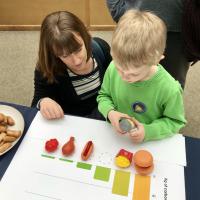Public Engagement with Research
Prof Susan Jebb, Dr Lesley Paterson and Lucy Yates

A game to estimate the environmental impacts of certain foods
It is not only the multi-disciplinary approach that makes LEAP exciting but also the central role of public engagement with research (PER) – a strategic approach to both consult and collaborate with various public constituencies throughout the research cycle, as well as the usual 'inform and disseminate' efforts (publications, reports and presentations) at the end. So what does this look like in reality? If you are not collecting data (one of the notional differences between people as 'participants' in research and as 'attendees' at PER events) then how can it be useful to you, the researcher, or even the institution? One way is just to use conversations and interactions as a barometer to gauge things like awareness, attitudes and the language used around certain topics. Luckily for us, food is a topic relevant to all of us, every day of our lives and it is common ground for conversation.
When undertaking public engagement events we want to:
- Gauge and raise awareness of the relationship between food choices and environmental impact
- Invite views on the acceptability of alternatives to meat and dairy products
- Test the effectiveness of different interventions e.g. how food labelling effects taste perception
- Involve families in conversations about the role of meat in their everyday diet